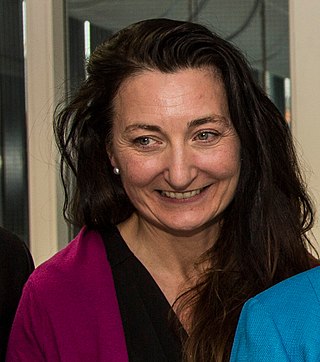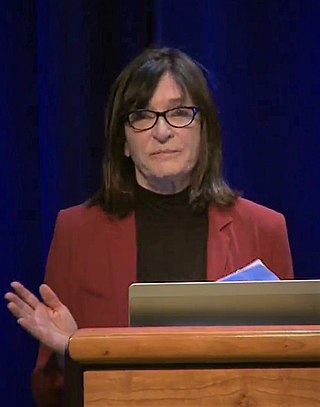Related Research Articles
Mary Dinsmore Ainsworth was an American-Canadian developmental psychologist known for her work in the development of the attachment theory. She designed the strange situation procedure to observe early emotional attachment between a child and their primary caregiver.

Lisa Feldman Barrett is a University Distinguished Professor of psychology at Northeastern University, where she focuses on affective science. She is a director of the Interdisciplinary Affective Science Laboratory. Along with James Russell, she is the founding editor-in-chief of the journal Emotion Review. Along with James Gross, she founded the Society for Affective Science.

Robert T. Gerlai is a Canadian behaviour geneticist and behavioural neuroscientist.

Nora S. Newcombe is the Laura H. Carnell Professor of Psychology and the James H. Glackin Distinguished Faculty Fellow at Temple University. She is a Canadian-American researcher in cognitive development, cognitive psychology and cognitive science, and expert on the development of spatial thinking and reasoning and episodic memory. She was the principal investigator of the Spatial Intelligence and Learning Center (2006-2018), one of six Science of Learning Centers funded by the National Science Foundation.

May-Britt Moser is a Norwegian psychologist and neuroscientist, who is a Professor of Psychology and Neuroscience at the Norwegian University of Science and Technology (NTNU). She and her former husband, Edvard Moser, shared half of the 2014 Nobel Prize in Physiology or Medicine, awarded for work concerning the grid cells in the entorhinal cortex, as well as several additional space-representing cell types in the same circuit that make up the positioning system in the brain. Together with Edvard Moser she established the Moser research environment at NTNU, which they lead. Since 2012 she has headed the Centre for Neural Computation.
Norman Tenner Adler through his research, teaching, writing, and academic administration, made major contributions to the modern study of biological psychology and in American higher education, having helped develop the fields that are now labeled behavioral neurobiology and evolutionary psychology. One of Adler's prominent experiments included an in depth analysis of mating performance of male rats and its relation to fertilization in the female, which led him to observe how behaviour could affect reproduction in species. With his students and colleagues, he has worked at the interface between biology and behavior. They have stressed the importance of combining the study of physiological mechanisms controlling behavior with the functional/adaptive significance of behavior in an evolutionary context. He was influenced in this approach by his undergraduate teachers at Harvard, especially Paul Rozin, Jerry Hogan, and Gordon Bermant, and his student colleagues like Don Pfaff with whom he has maintained scientific relationships over the years. His research was also impacted by Daniel Lehrman, and he worked closely with Lehrman's student, Barry Komisaruk, on hormones and neural functioning. Adler is also a prominent figure in American higher education, especially the role of behavioral neuroscience in liberal arts education and religion in the college classroom. He participated in Phillip Zimbardo's PBS TV series Discovering Psychology, one of the first distance-learning courses in psychology.
Daniel S. Lehrman was an American naturalist, animal psychologist, ornithologist and comparative psychologist.

Carol A. Barnes is an American neuroscientist who is a Regents' Professor of psychology at the University of Arizona. Since 2006, she has been the Evelyn F. McKnight Chair for Learning and Memory in Aging and is director of the Evelyn F. McKnight Brain Institute. Barnes has been president of the Society for Neuroscience and is a Fellow of the American Association for the Advancement of Science, and foreign member of the Royal Norwegian Society of Sciences and Letters. She was elected to the National Academy of Sciences in 2018.

Parental experience, as well as changing hormone levels during pregnancy and postpartum, cause changes in the parental brain. Displaying maternal sensitivity towards infant cues, processing those cues and being motivated to engage socially with her infant and attend to the infant's needs in any context could be described as mothering behavior and is regulated by many systems in the maternal brain. Research has shown that hormones such as oxytocin, prolactin, estradiol and progesterone are essential for the onset and the maintenance of maternal behavior in rats, and other mammals as well. Mothering behavior has also been classified within the basic drives.

Jay Seth Rosenblatt held the position of emeritus professor of psychology at Rutgers University-Newark. At the time of his retirement in 2005, he was the Daniel S. Lehrman Professor of Psychobiology. He was a scientist, psychotherapist and painter. His scientific research largely established the study of neonate learning and especially mother-offspring behavior throughout the maternal cycle. For the latter work, he was known in developmental psychobiology as the "father of mothering". He received several honors and awards during his career, including election to the American Association for the Advancement of Science.
Donald George Marquis was an American psychologist and a past president of the American Psychological Association (APA). He was best known for his tenure as a department chair and professor at the University of Michigan.

Jee Hyun Kim is an Australian behavioral neuroscientist whose work focuses on emotional learning and memory during childhood and adolescence. She is a professor, ARC future fellow, and head of the Molecular Psychiatry Laboratory at the Deakin University School of Medicine, Australia

David Pafford Crews is the Ashbel Smith Professor of Zoology and Psychology at the University of Texas at Austin. He has been a pioneer in several areas of reproductive biology, including evolution of sexual behavior and differentiation, neural and phenotypic plasticity, and the role of endocrine disruptors on brain and behavior.

Frances A. Champagne is a Canadian psychologist and University Professor of Psychology at the University of Texas at Austin known for her research in the fields of molecular neuroscience, maternal behavior, and epigenetics. Research in the Champagne lab explores the developmental plasticity that occurs in response to environmental experiences. She is known for her work on the epigenetic transmission of maternal behavior. Frances Champagne's research has revealed how natural variations in maternal behavior can shape the behavioral development of offspring through epigenetic changes in gene expression in a brain region specific manner. She won the NIH Director's New Innovator Award in 2007 and the Frank A. Beach Young Investigator Award in Behavioral Neuroendocrinology in 2009. She has been described as the "bee's knees of neuroscience". She serves on the Committee on Fostering Healthy Mental, Emotional, and Behavioral Development Among Children and Youth in the United States.
Angela J. Grippo is an American neuroscientist and health psychologist known for her research on stress, mood disorders, and cardiovascular disease. She is an associate professor of psychology at Northern Illinois University.
Rae Silver is a Canadian behavioral neuroendocrinologist and neuroscientist best known for her research on the role of the suprachiasmatic nucleus (SCN) of the hypothalamus in generating circadian rhythms, the role of mast cells in the brain, the physiological mechanisms of parental behavior in ring doves. She is currently the Helene L. and Mark N. Kaplan Professor of Natural & Physical Sciences and is currently the Chair of the Neuroscience Program and Professor of Psychology at Barnard College. In addition, she is jointly appointed as a Professor in the Department of Psychology at Columbia University and in the Department of Pathology and Cell Biology with the Columbia College of Physicians and Surgeons.

Michela Gallagher is an American cognitive psychologist and neuroscientist. She is the Krieger-Eisenhower Professor of Psychology and Neuroscience at Johns Hopkins University. Her scientific work has changed the model of neurocognitive aging, and developed new indices for its study. Previously, work had focused on neurodegeneration as a primary cause of memory loss.

Staci Bilbo is an American neuroimmunologist and The Haley Family Professor of Psychology and Neuroscience at Duke University. Bilbo also holds a position as a research affiliate at Massachusetts General Hospital overseeing research within the Lurie Center for Autism. As the principal investigator of the Bilbo Lab, Bilbo investigates how environmental challenges during the perinatal period impact the immune system and further influence brain development, cognition, and affective behaviors later in life..

BJ Casey is an American cognitive neuroscientist and expert on adolescent brain development and self control. She is the Christina L. Williams Professor of Neuroscience at Barnard College of Columbia University where she directs the Fundamentals of the Adolescent Brain (FAB) Lab and is an Affiliated Professor of the Justice Collaboratory at Yale Law School, Yale University.
Liisa Ann Margaret Galea is a Canadian neuroscientist who is a professor of psychology at the University of British Columbia. She is a member of the Centre for Brain Health and Director of the Graduate Programme in Neuroscience. Her research considers the impact of hormones on brain health and behaviour.
References
- 1 2 3 "Alison Fleming".
- ↑ Fleming, Alison S. (2007). "The three faces of Jay S. Rosenblatt". Developmental Psychobiology. 49 (1): 2–11. doi: 10.1002/dev.20193 . PMID 17186510.
- 1 2 3 4 "Alison Fleming CV" (PDF).
- ↑ "D.G. Marquis Behavioral Neuroscience Award". Society for Behavioral Neuroscience and Comparative Psychology.
- ↑ "Daniel S. Lehrman Lifetime Achievement Award". Society for Behavioral Neuroendocrinology.